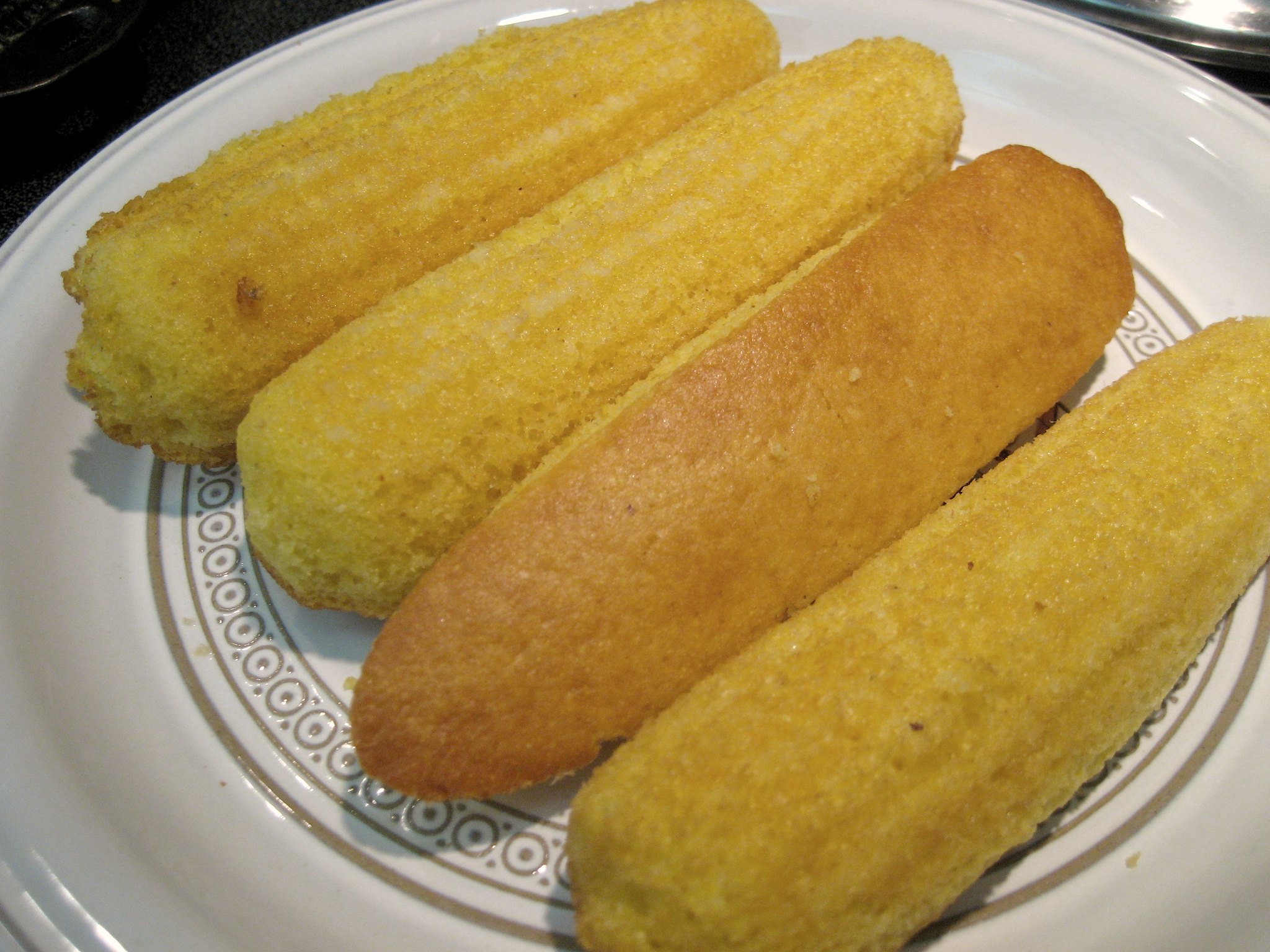Books & Culture
In Praise of the Corn-Pone Opinion
Mark Twain used corn-pone as a metaphor for conformity. But maybe both corn-pone and conformity deserve a second look

Years of thought and debate have gone into this monumental question and yet it’s still to be answered: Is there a difference between corn-pone and corn bread? And is corn-pone cooked in a skillet or baked? Should it have sugar, milk, or eggs? Should it have baking soda? Is corn-pone one word or two? There are no such difficulties, however, when it comes to distinguishing corn-pone, whatever that is, from Trinidad’s “pone.”
Trinidad pone is a delicious delectable dessert, a confection crafted from cassava, coconut, sugar, and spice. It’s sold everywhere: to hoity-toity hipsters in uppity farmers’ markets, and to starving bachelors at no-frill vegetable stalls, to momzillas in bakeries on the main street, and to old tanties in parlors on the corner, to blue-collar workers shopping in supermarket chains, and to smiling-faced children in tiny school cafes. I’ve had “gourmet” pone, from a restaurant that specialises in “deconstructed local classics.” I’ve had pone from a tired lady selling snacks to raise funds for her sick son. I’ve had pone warm, lightly drizzled with a caramel sauce. I’ve eaten it cold, as if it were some kind of iced treat, on the warm sands of the northern coast.
Pone is made of cassava but if you’re not a purist (and want to be wrong) there’s leeway as to what you can put in it. Some people use pumpkin to add excitement to their life by raising the color of the dish, which tends to fall somewhere along a spectrum between pale brown to golden. The texture of pone, however, is consistently the same: gelatinous Turkish delight cocooned in a crisp cassava coconut skin. Connoisseurs of taste add loads of spice: cinnamon, nutmeg, ginger, clove, ground spice. The raucous and more adventurous throw in raisins, but this is universally accepted to be a gratuitous touch.
Some dictionaries say a corn-pone is a simple-minded person.
Trinidad pone isn’t to be confused with Jamaican pone, which is, unfortunately, made from sweet potato, milk, sugar, and rum. Incidentally, the overbearingly lumpy Jamaican pone is at times made from cornmeal and is as ostentatious as a dancehall queen. The Jamaican use of cornmeal makes the theory that the Caribbean pone is the sweeter, better-looking brother to the American pone seem plausible.
Yet, for all these nuances, Trinidadians feel no need for precision. A Trinidadian will call cassava pone simply “pone,” removing the adjective in the assumption that what constitutes pone here must also be pone everywhere. In fact, had I not encountered Mark Twain’s famous essay “Corn-pone Opinions,” I might never have questioned what a pone is and how it differs from a bread. Nor would I have pondered the fact that some dictionaries say a corn-pone is a simple-minded person, a meaning which might have something to do with the argument in Twain’s essay.
Twain isn’t concerned with the complexities of pone aesthetics. He takes for granted that when he opens his essay with a slave saying, “You tell me whar a man gits his corn pone, en I’ll tell you what his ’pinions is,” we’ll know what corn pone is and, what’s more, that we’ll understand its place in 1901 society. Admittedly, he didn’t publish the essay in his lifetime—it was published posthumously in 1923. But Twain being dead hasn’t stopped him from publishing acclaimed work. His essay opens the 2001 Best American Essays of the Century, edited by Joyce Carol Oates.
Instead of dessert, Twain has his sights on making a mundane point about the way people think, or rather, don’t. He believes his friend, the slave, is saying man is not independent and cannot afford views that might interfere with his bread and butter (to mix up the pone metaphor a bit). He also feels his friend is saying that in order to prosper we must all line up with the majority, must think and feel what everybody else thinks and feels, or else suffer the consequences.
“He must restrict himself to corn-pone opinions,” Twain paraphrases. “He must get his opinions from other people; he must reason out none for himself; he must have no first-hand views.”
Twain doesn’t fully agree with this. He thinks the situation is more dire. Whereas his friend feels people cherry-pick their opinions strategically, Twain believes this exceeds their capabilities. Whereas his friend assumes it’s possible to formulate original positions, Twain casts doubt on the existence of free thought. He says: “I am persuaded that a coldly-thought-out and independent verdict upon a fashion in clothes, or manners, or literature, or politics, or religion, or any other matter that is projected into the field of our notice and interest, is a most rare thing—if it has ever existed.” To wit, the only way people could like hideous hoop skirts was because everyone else did.
When I was a wee little child, I was a well-behaved Trinidadian boy. I listened to my parents. I went to church. I tried to become an acolyte (though they threw me out after suspecting I was more into the pretty, flowing gowns than the Holy Ghost). I paid attention in school. Back then, the Belmont Boys Roman Catholic School was yet to develop a reputation for bad boys and ruffians. I studied hard.
By Standard Five, however, this good behavior started to get me into trouble. As everyone knows, there is only so much good behavior that little boys can take. The other boys grumbled, softly at first, then openly, that I had never made a mark in the world, had never distinguished myself through any form of truancy, had neglected to uphold the long-held tradition of boys being in fights. Such was my appalling decency and civic-mindness, that the elder boys were incensed. I became a pariah, a figure of censure, persona non grata.
To address this misconduct, it behooved me to take action. I arranged, with another similarly-circumstanced do-gooder, to orchestrate a skirmish. We discussed our plan prior, and scheduled an appropriate day for the momentous duel. Naivety got the better of us: we believed it necessary to come up with a background story to justify our war. A jumbled narrative, involving the theft of marbles and a lunch kit in which a precious piece of pone had been stolen, was formulated and tantalisingly teased out. There was enough withholding of key details to fan the flames of speculation and conjecture. Then, the Friday of our chosen appointment arrived. We wanted tales of our exploits to spread over the weekend.
The school bell rang like a death knell. I immediately pushed Kwesi around for a while, he grabbed the neck of my shirt, I ripped off a button or two of his, as we groaned and grunted strenuously as a mark of our manly exertions. The fight needed to have an epic scale so we prolonged it for as long as possible until, both of us having run out of moves, it came to a natural end. It was determined—universally I think—that the fight was a good one, that we both had “won” since there was little to distinguish us, though maybe Kwesi had a few more scratches on his arm than I did.
So when Mark Twain alludes to the ridiculous lengths people will endure in order to conform, I fully understand.
Entire careers have been built on work that is unlikeable but has nonetheless found favor with people, or at least been said to have found favor with people.
And I think it’s safe to say everyone has had that moment when there’s a new emperor and he’s not wearing clothes but you have to pretend he is and not only do you have to pretend he is but you also have to compliment him on just how fabulous the clothes are even if you’re seeing nothing but you do it anyway because everyone else is complimenting him and if you don’t people will think you are dumb or blind or just plain mean. The Emperor’s New Clothes explains the success of many films, books, plays, and art exhibitions. Entire careers have been built on work that is, even within the subjective realm of the humanities, unlikeable but which has nonetheless found favor with people, or at least been said to have found favor with people, the snowball growing bigger and bigger, threatening to squash anyone who will not yield. Twain was on to something.
Social media has magnified this. It’s given us tools by which we can empirically gauge just how admired something is, how many views it has received, the quantum of votes it has drawn or comments it has acquired. Some of us, seeing only that other people have liked something, sheepishly click the like button without reading the full post, or listening to the full podcast, or watching the full 20-minute video.
But when Twain’s nameless slave, whom we will call Uncle Jake, says “You tell me whar a man gits his corn pone, en I’ll tell you what his ’pinions is,” what Uncle Jake truly means is not what Twain hears. What Uncle Jake was alluding to was the unabashed fact that people are generally self-serving. We all have vested interests, hidden agendas, values that fall to the wayside if there is a need to ensure self-preservation. People do not consider deontological values, as a philosopher might say, nor do they care about the greater utilitarian good; we do not have such luxuries when living from day to day, meal to meal, paycheck to paycheck. This does assume the capacity for independent thinking. But the premise is not the conclusion.
Nor is it worthwhile attacking that premise. For assertion of self-preservation is selfish, sovereign thinking. What is more independent than that?
Is Twain really skeptical of free thinking? If there is no independent thought in the world, this would render his corn-pone opinions automatic. We would live in a world of determinism. There would be no choices on the menu. What would be the point of saying someone has an opinion? We would all have a passion for hoop skirts come hell or high water.
Even if Twain’s interpretation is substantially correct, I have reservations about his argument.
“We are creatures of outside influences,” he argues, “as a rule we do not think, we only imitate.” However, even when we copy others, we mentally formulate our positions. We decide, consciously or even subconsciously, whether we will follow the status quo. Twain underestimates how much we intuit.
All this cogitation on corn-pone opinions makes one have a hankering for corn-pone itself. But what exactly does it taste like? As Tom Sawyer did before me, I steal into the kitchen. Call it research. Call it art. Call it hunger. Why shouldn’t I indulge my taste buds? I devise a plan. I assess the stocks in my pantry, pull out my smartphone, and scour the internet for recipes. This throws up the first challenge. The search yields a million results.
Corn-pone is so popular there must be a reason. It’s clearly been around for a long time. The internet tells me it’s a Native American dish, corn being primarily a Native American invention. (Interestingly, Trinidad’s pone, made from cassava, has also been linked to our indigenous peoples.)
My chosen recipe calls for just five things: cornmeal, water, milk, salt, and baking powder. I’m not sure about the baking powder, though. Wouldn’t the more authentic corn-pone be flat and unleavened? Did people always have baking powder to hand when roving through the forest, pitching tents, lighting fires and whatnot?
I halve the recipe. Don’t really need four corn-pones for this experiment when two will suffice. Listed are precise measurements to follow, but I’ve got a deft hand so I go with the flow, eyeing the amounts I put it. Cooking is a science but it’s also an art. You use what’s to hand, you do what feels right, drawing from experience.
We do not always think things through, yes, but at the same time we feel. We intuit and, therefore, we reason.
Just as meals are fashioned in this intuitive way, so too do we formulate viewpoints. We are not machines. We do not always think things through, yes, but at the same time we feel. We intuit and, therefore, we reason.
The corn meal is a light dusty yellow, but when I add my liquid ingredients the color gets deeper: more saffron than butternut, more turmeric than lemon. It comes together in a dough that’s similar to the dough we use in Trinidad to make Christmas pastelles, a kind of stuffed polenta; a steamed empanada. As I knead the dough, which feels like the plasticine children used to amuse themselves with, feels as real as thoughts made material, I think about how easy it is to forget the past, forget the names the of all the tribes and peoples that might have done the same thing. Yet we are still tied to them. A simple thing like a meal can be a commemoration.
Our very nature is to feel. Feeling allows us to sense whether we think something is moral. Our emotions guide us. This is a kind of reason. Without having a principle clearly formulated in our mind, we know something is bad by just the way we feel. Stealing. Killing. Lying. We talk of conscience. Even if something is the bees’ knees, we first have to decide if it tickles our fancy. Hoop skirts only became the rage because they pleased us on a level we may not have been able to articulate.
Sometimes the results of this process are dangerous: the wrong emotions dominate. So it is fear that accounts for the rise of the Nazis, the racism of Twain’s America, the xenophobia of Britain. The Brexit vote and the rise of Donald Trump have emboldened certain people to come out and follow suit. The cause: fear. People are afraid of that most reliable of Boogeymen, The Other. The counter to such fear is to draw upon opposite and equally powerful emotions: compassion, love, kindness. Understanding that we are all human. For things to change, these purer feelings must be admitted into the equation.
My pones are surprisingly satisfying. I try them with butter. I try them with maple syrup. I try cheese. They are like arepas. They can match whatever you put on them, meet flavors halfway.
But let’s say Twain is right and all we do is conform. Can’t conforming still be a form of resistance? Can’t it trigger rebellion? Be its own sign of an independent assertion of values?
When Rosa Parks got onto the bus in Montgomery, Alabama, on December 1, 1955, she didn’t disobey any rules. She conformed to them. The prevailing laws divided the bus into white and black sections. Parks sat in the black section. When the white section filled up, the bus driver attempted to expand the section for whites only. The law called for “equal but separate accommodations”; it didn’t permit this practice of shifting the goalpost, a practice that had apparently developed over time. Parks stayed in the section designated for her under the law. She said: “When that white driver stepped back toward us, when he waved his hand and ordered us up and out of our seats, I felt a determination cover my body like a quilt on a winter night.” It was by conforming to a racist law that she asserted her individuality. It was through this conforming that she defied everything. If individuals could find freedom through compliance, so too could entire nations.
Can’t conforming still be a form of resistance? Can’t it trigger rebellion?
In the late 20th century, a wave swept through the Caribbean. Territories of the British Empire sought what Rosa Parks achieved. They flirted with, lobbied for, then gained independence. Jamaica and Trinidad and Tobago in 1962, Barbados and Guyana in 1966, Bahamas in 1973, Grenada in 1974, Suriname in 1975, Dominica in 1978, St. Lucia in 1979, St. Vincent in 1979, Belize and Antigua and Barbuda in 1981, St. Kitts and Nevis in 1983. One by one, they attained access to the comity of nations.
Was this wave merely a case of following fashion? Or was swimming with the tide a way of swimming against it? By emulating each other’s example, these countries cultivated the sense of a shared destiny. This made the fate of the islands irresistible. In this way, independence was achieved not through bloody rebellion, but through collective power. There was strength in numbers. As swimmers in the Caribbean will tell you sometimes, to survive a deadly current, you must let it take you then slowly make your way to the shore.
“Power is everywhere,” wrote Michel Foucault, “not because it embraces everything, but because it comes from everywhere.” We see power in action when individuals protest peacefully. We see it when nations come together to raise a fist. We also see it when artists, painters, musicians, writers, and poets adopt forms that on the surface seem like imitations but, in truth, are signals of resistance.
St. Lucian poet Derek Walcott and gay poet Thom Gunn did this. They sometimes put on a costume, paraded in it, then took it off in order to move on to the next poem, or sequence or book. In their verse, these poets set out to show they too could write in the traditional forms that have dominated English letters for centuries. Walcott took on the idea of the epic, its rhythms, tones and textures. He co-opted the theatre, emulating Shakespeare, and produced dramas in verse. He applied these forms not to white, European subjects, but to the Caribbean. His mimicking was not appeasement. It was an assertion of a black man’s inherent and equal claim to words. “The English language is nobody’s special property,” he said.
Like Walcott, Gunn was a poet with a penchant for the metres of a long tradition. His poems followed a regimented pulse. Sonnets, elegies, syllabic verse, couplets. Yet, using these forms Gunn addressed the queer, even when carefully wrapped and tied with a metaphorical bow. The poem ‘The Allegory of the Wolf Boy’ is about life as a gay adolescent. Like Walcott, he too was laying down the gauntlet on behalf of a disenfranchised class. “Rebellion,” Gunn wrote, “comes dressed in conformity”.
These poets know what Twain forgets. Twain underestimates how following can be leading. It can be the ultimate inside job.
Corn-pone opinions reflecting the general consensus might appear shallow, simplistic, half-baked. But that alone should not stop us from taking a second good bite.








